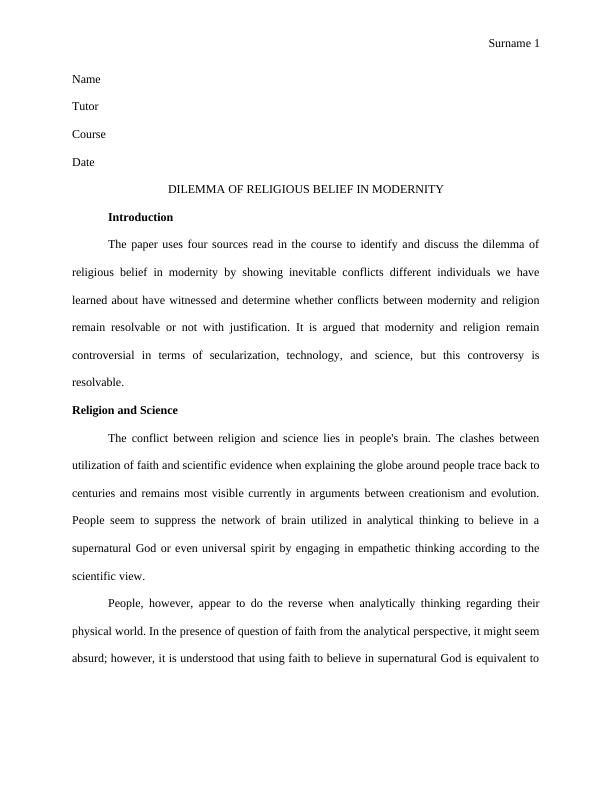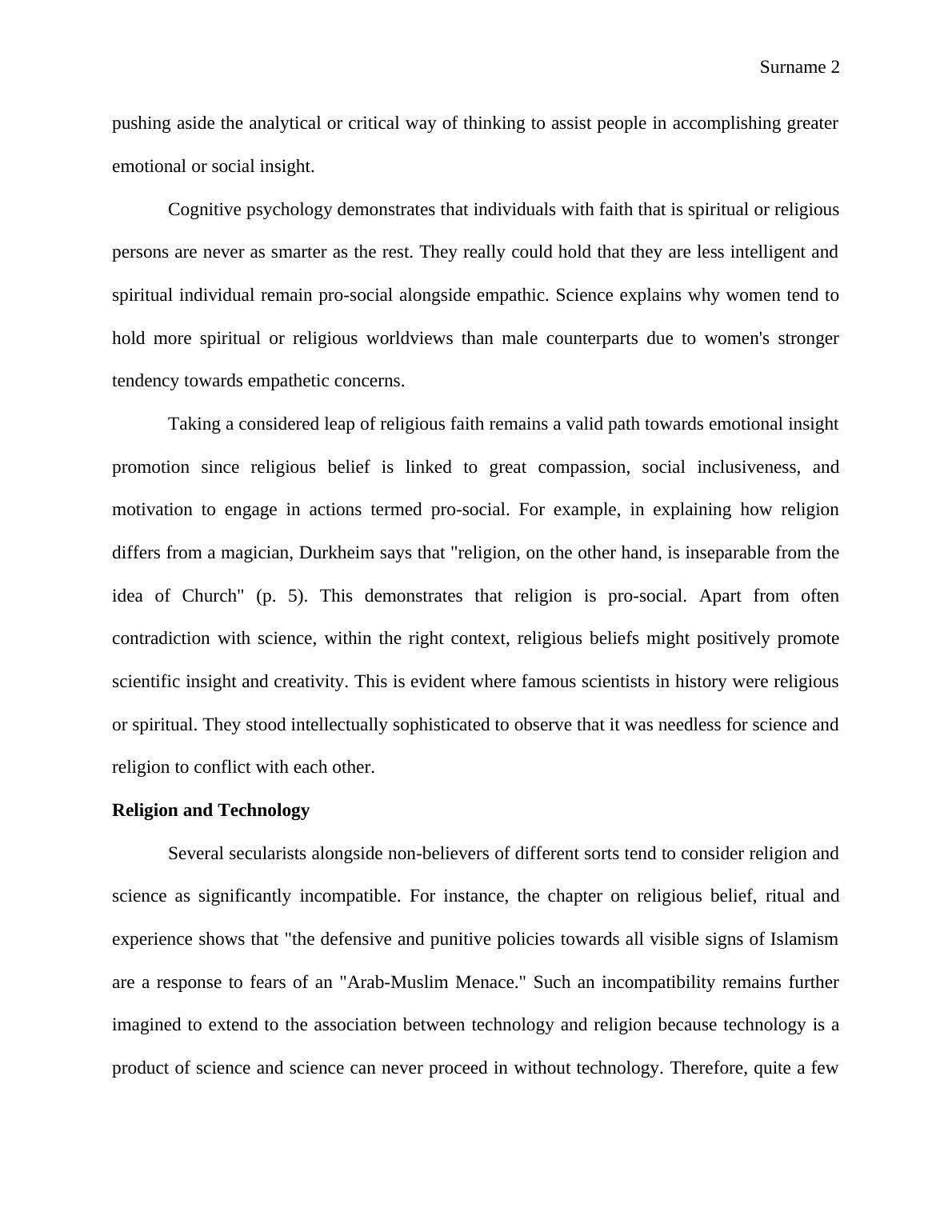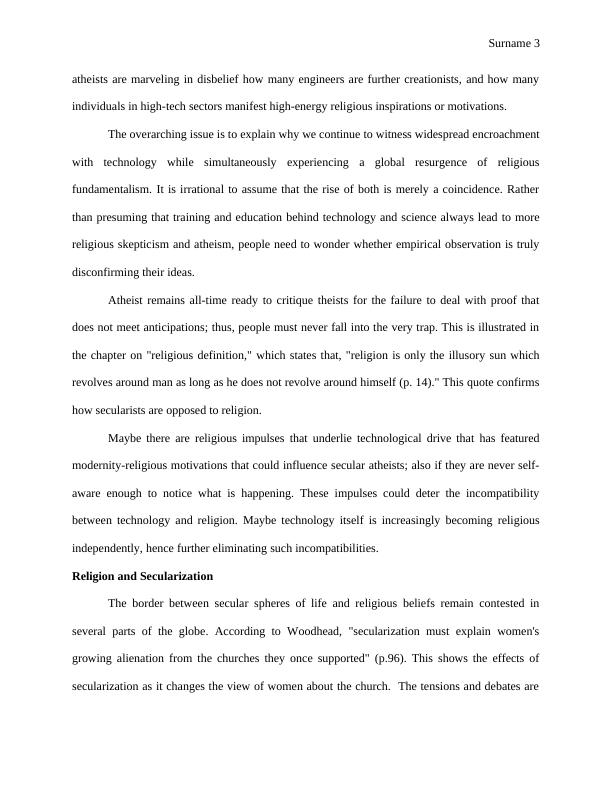Dilemma of Religious Belief in Modernity
6 Pages1371 Words392 Views
Added on 2023-03-30
About This Document
This paper discusses the conflicts between modernity and religion in terms of science, secularization, and technology. It explores the dilemma and argues that the controversy is resolvable.
Dilemma of Religious Belief in Modernity
Added on 2023-03-30
ShareRelated Documents
Surname 1
Name
Tutor
Course
Date
DILEMMA OF RELIGIOUS BELIEF IN MODERNITY
Introduction
The paper uses four sources read in the course to identify and discuss the dilemma of
religious belief in modernity by showing inevitable conflicts different individuals we have
learned about have witnessed and determine whether conflicts between modernity and religion
remain resolvable or not with justification. It is argued that modernity and religion remain
controversial in terms of secularization, technology, and science, but this controversy is
resolvable.
Religion and Science
The conflict between religion and science lies in people's brain. The clashes between
utilization of faith and scientific evidence when explaining the globe around people trace back to
centuries and remains most visible currently in arguments between creationism and evolution.
People seem to suppress the network of brain utilized in analytical thinking to believe in a
supernatural God or even universal spirit by engaging in empathetic thinking according to the
scientific view.
People, however, appear to do the reverse when analytically thinking regarding their
physical world. In the presence of question of faith from the analytical perspective, it might seem
absurd; however, it is understood that using faith to believe in supernatural God is equivalent to
Name
Tutor
Course
Date
DILEMMA OF RELIGIOUS BELIEF IN MODERNITY
Introduction
The paper uses four sources read in the course to identify and discuss the dilemma of
religious belief in modernity by showing inevitable conflicts different individuals we have
learned about have witnessed and determine whether conflicts between modernity and religion
remain resolvable or not with justification. It is argued that modernity and religion remain
controversial in terms of secularization, technology, and science, but this controversy is
resolvable.
Religion and Science
The conflict between religion and science lies in people's brain. The clashes between
utilization of faith and scientific evidence when explaining the globe around people trace back to
centuries and remains most visible currently in arguments between creationism and evolution.
People seem to suppress the network of brain utilized in analytical thinking to believe in a
supernatural God or even universal spirit by engaging in empathetic thinking according to the
scientific view.
People, however, appear to do the reverse when analytically thinking regarding their
physical world. In the presence of question of faith from the analytical perspective, it might seem
absurd; however, it is understood that using faith to believe in supernatural God is equivalent to

Surname 2
pushing aside the analytical or critical way of thinking to assist people in accomplishing greater
emotional or social insight.
Cognitive psychology demonstrates that individuals with faith that is spiritual or religious
persons are never as smarter as the rest. They really could hold that they are less intelligent and
spiritual individual remain pro-social alongside empathic. Science explains why women tend to
hold more spiritual or religious worldviews than male counterparts due to women's stronger
tendency towards empathetic concerns.
Taking a considered leap of religious faith remains a valid path towards emotional insight
promotion since religious belief is linked to great compassion, social inclusiveness, and
motivation to engage in actions termed pro-social. For example, in explaining how religion
differs from a magician, Durkheim says that "religion, on the other hand, is inseparable from the
idea of Church" (p. 5). This demonstrates that religion is pro-social. Apart from often
contradiction with science, within the right context, religious beliefs might positively promote
scientific insight and creativity. This is evident where famous scientists in history were religious
or spiritual. They stood intellectually sophisticated to observe that it was needless for science and
religion to conflict with each other.
Religion and Technology
Several secularists alongside non-believers of different sorts tend to consider religion and
science as significantly incompatible. For instance, the chapter on religious belief, ritual and
experience shows that "the defensive and punitive policies towards all visible signs of Islamism
are a response to fears of an "Arab-Muslim Menace." Such an incompatibility remains further
imagined to extend to the association between technology and religion because technology is a
product of science and science can never proceed in without technology. Therefore, quite a few
pushing aside the analytical or critical way of thinking to assist people in accomplishing greater
emotional or social insight.
Cognitive psychology demonstrates that individuals with faith that is spiritual or religious
persons are never as smarter as the rest. They really could hold that they are less intelligent and
spiritual individual remain pro-social alongside empathic. Science explains why women tend to
hold more spiritual or religious worldviews than male counterparts due to women's stronger
tendency towards empathetic concerns.
Taking a considered leap of religious faith remains a valid path towards emotional insight
promotion since religious belief is linked to great compassion, social inclusiveness, and
motivation to engage in actions termed pro-social. For example, in explaining how religion
differs from a magician, Durkheim says that "religion, on the other hand, is inseparable from the
idea of Church" (p. 5). This demonstrates that religion is pro-social. Apart from often
contradiction with science, within the right context, religious beliefs might positively promote
scientific insight and creativity. This is evident where famous scientists in history were religious
or spiritual. They stood intellectually sophisticated to observe that it was needless for science and
religion to conflict with each other.
Religion and Technology
Several secularists alongside non-believers of different sorts tend to consider religion and
science as significantly incompatible. For instance, the chapter on religious belief, ritual and
experience shows that "the defensive and punitive policies towards all visible signs of Islamism
are a response to fears of an "Arab-Muslim Menace." Such an incompatibility remains further
imagined to extend to the association between technology and religion because technology is a
product of science and science can never proceed in without technology. Therefore, quite a few

Surname 3
atheists are marveling in disbelief how many engineers are further creationists, and how many
individuals in high-tech sectors manifest high-energy religious inspirations or motivations.
The overarching issue is to explain why we continue to witness widespread encroachment
with technology while simultaneously experiencing a global resurgence of religious
fundamentalism. It is irrational to assume that the rise of both is merely a coincidence. Rather
than presuming that training and education behind technology and science always lead to more
religious skepticism and atheism, people need to wonder whether empirical observation is truly
disconfirming their ideas.
Atheist remains all-time ready to critique theists for the failure to deal with proof that
does not meet anticipations; thus, people must never fall into the very trap. This is illustrated in
the chapter on "religious definition," which states that, "religion is only the illusory sun which
revolves around man as long as he does not revolve around himself (p. 14)." This quote confirms
how secularists are opposed to religion.
Maybe there are religious impulses that underlie technological drive that has featured
modernity-religious motivations that could influence secular atheists; also if they are never self-
aware enough to notice what is happening. These impulses could deter the incompatibility
between technology and religion. Maybe technology itself is increasingly becoming religious
independently, hence further eliminating such incompatibilities.
Religion and Secularization
The border between secular spheres of life and religious beliefs remain contested in
several parts of the globe. According to Woodhead, "secularization must explain women's
growing alienation from the churches they once supported" (p.96). This shows the effects of
secularization as it changes the view of women about the church. The tensions and debates are
atheists are marveling in disbelief how many engineers are further creationists, and how many
individuals in high-tech sectors manifest high-energy religious inspirations or motivations.
The overarching issue is to explain why we continue to witness widespread encroachment
with technology while simultaneously experiencing a global resurgence of religious
fundamentalism. It is irrational to assume that the rise of both is merely a coincidence. Rather
than presuming that training and education behind technology and science always lead to more
religious skepticism and atheism, people need to wonder whether empirical observation is truly
disconfirming their ideas.
Atheist remains all-time ready to critique theists for the failure to deal with proof that
does not meet anticipations; thus, people must never fall into the very trap. This is illustrated in
the chapter on "religious definition," which states that, "religion is only the illusory sun which
revolves around man as long as he does not revolve around himself (p. 14)." This quote confirms
how secularists are opposed to religion.
Maybe there are religious impulses that underlie technological drive that has featured
modernity-religious motivations that could influence secular atheists; also if they are never self-
aware enough to notice what is happening. These impulses could deter the incompatibility
between technology and religion. Maybe technology itself is increasingly becoming religious
independently, hence further eliminating such incompatibilities.
Religion and Secularization
The border between secular spheres of life and religious beliefs remain contested in
several parts of the globe. According to Woodhead, "secularization must explain women's
growing alienation from the churches they once supported" (p.96). This shows the effects of
secularization as it changes the view of women about the church. The tensions and debates are

End of preview
Want to access all the pages? Upload your documents or become a member.
Related Documents
Name Tutor Course Date.lg...
|3
|461
|23
Impact of Scientific Revolution on Ancient Beliefs and Western Societylg...
|4
|737
|155
The Scientific Revolution and the Enlightenment PDFlg...
|5
|880
|139
